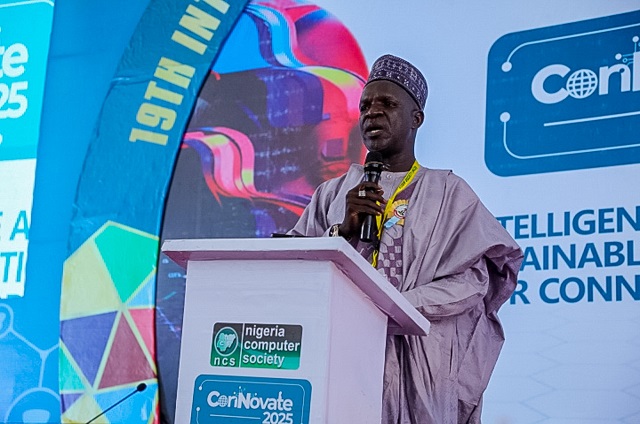Nigeria’s journey toward a globally competitive digital economy hinges on the fusion of intelligence, security, and sustainability, according to the Director General of the National Information Technology Development Agency (NITDA), Kashifu Inuwa.
Speaking in Kano on Tuesday at the opening of the 19th International Conference (CONNOVATE 2025) of the Nigerian Computer Society (NCS), Inuwa stressed that these three elements are now “indispensable drivers of national progress.”
The conference, themed “Intelligent, Secure, and Sustainable Innovations for a Connected World”, brought together technology leaders, researchers, and innovators.
Represented by Engr. Salisu Kaka, Director of E-Government and Digital Economy Development, Inuwa underscored the need for their convergence to unlock opportunities in Nigeria’s technology space, citing Estonia’s X-Road platform, which delivers 99% of government services online, as a global benchmark.
“In Nigeria, trust is the ultimate currency in our high-stakes digital environment, where scams and cybercrime are prevalent. Security builds and protects this trust,” he said.
While security provides the foundation, Inuwa added, intelligence builds the structure, pointing to Artificial Intelligence (AI), Machine Learning (ML), and data analytics as tools for addressing Nigeria’s complex challenges. “Innovation without security is unsustainable,” he warned, comparing it to “a high-performance race car without brakes.”
The NITDA boss called on the next generation of Nigerian startups to think beyond digitising existing processes and instead focus on creating new value, and cited AI-powered wealth management systems and ML-driven remote diagnostics as examples of transformative innovation.
He also highlighted initiatives under the Federal Ministry of Communications, Innovation and Digital Economy (FMCIDE) designed to advance this vision.
These include the National Centre for Artificial Intelligence and Robotics (NCAIR), the Computer Emergency Readiness and Response Team (CERRT), the Nigeria Data Protection Act (NDPA) 2023, the national digital identity programme, interoperable payments systems, and human capital programmes such as the 3 Million Technical Talent (3MTT) and Digital Literacy for All (DL4ALL) projects.
Referencing the International Federation for Information Processing (IFIP) President, Antony Wong, Inuwa emphasised the need for stronger data protection and strategic use of information in the Global South to safeguard indigenous knowledge.
He called for legal clarity on data ownership as Nigeria’s cultural heritage in medicine, ecology, and art becomes digitised and integrated into AI systems.
Wong, who commended Nigeria’s role in the recent World Intellectual Property Organization (WIPO) treaty protecting genetic resources and traditional knowledge, noted that such measures are vital for the future.
In his welcome address, NCS President, Dr. Muhammad Sirajo, said the conference aims to provide an interdisciplinary platform for IT professionals to explore solutions to critical issues, including intelligent systems, fintech, sustainable energy, and innovations in agriculture, health, education, and national planning.
“This conference will provide an interdisciplinary platform for researchers, practitioners, and educators to present and discuss recent innovations, trends, and solutions for improving technological systems,” Sirajo said.
The week-long event features plenary sessions, a doctoral consortium, a youth and entrepreneurship forum, the Fellows Forum, the Annual General Meeting, an IT quiz competition for students, and an induction ceremony for new members.
It will close with the election of new national executives, a dinner, and an awards night recognising outstanding contributions to the ICT sector.

